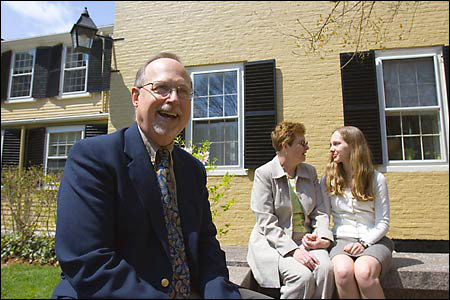The Beans of Tulia, Texas
Family, including GSAS student, takes on police corruption in Southern town
Nancy Bean dreamed of leaving the antiseptic middle-class suburb where she lived with her husband and three children and returning to the small Texas town of Tulia where she was raised. She wanted her kids to experience the slower, simpler life of home canning and quilting bees that she remembered from childhood, to know what it was like to live closer to the land, surrounded by a large extended family.
The Beans did move back to Tulia, but it didn’t turn out as they expected. A few years after coming home, they found themselves shunned by family members and by most of the community, and often afraid for their lives. And yet today they have no regrets about throwing themselves into the civil rights conflict that cost them their social standing in the town.
“We don’t go to bed at night thinking, ‘Oh, my life doesn’t mean anything,’” said husband Alan.
“Once you get a taste of this, there’s no going home,” Nancy added.
The Beans were at Harvard this week to talk about the odyssey that changed them from middle-of-the-road Americans to the proverbial prophets dishonored in their own country, and also to visit their daughter Lydia, a fourth-year Ph.D. candidate in sociology at the Graduate School of Arts and Sciences.

Nancy spoke April 24 at Dudley House and Alan spoke April 26 at Harvard Law School.
In 1999, the Beans founded an organization called Friends of Justice. It began with a series of meetings in their home to decide what to do about a recent drug bust in which 46 people (39 of them African American) had been indicted on the uncorroborated testimony of a single narcotics agent. The local paper reported the bust as if it were a major victory over a powerful underworld gang, but something about the story didn’t ring true to the Beans.
“We wondered, ‘How can there be 46 drug dealers in a town of 5,000?’ Who were they selling to?” Nancy said.
The case grew more disturbing as the identities of the defendants became clear. Most were poor, either unemployed or semi-employed. None of them owned their own house or even their own car. A man named Joe Moore, identified as a “drug kingpin,” turned out to be a 57-year-old African-American pig farmer living in a shack. None of these facts seemed to jibe with what had been alleged by the narcotics agent, a man named Tom Coleman, who seemed to delight in the media attention he received as a result of the bust.
“In interviews Coleman made Tulia sound like the mean streets of Chicago, with fancy cars and boats in people’s driveways,” Alan said. “These people don’t even have driveways.”
The Beans describe Coleman as “a train wreck of a guy” whose abiding and unrealized ambition was to be a Texas Ranger. Instead, he had bounced from town to town taking low-level law enforcement jobs and leaving numerous unpaid debts in his wake, the Beans said. His salary for his position as an officer on the local narcotics task force came from the Byrne grant, a federal program designed to fund the War on Drugs in rural areas not served by the Drug Enforcement Administration (DEA).
Coleman’s police work was atrocious, the Beans said. He never wore a wire or had a partner verify his reports, and the only notes he took he claimed he had written on his leg. And yet the local court accepted his stories at face value and gave many of the defendants sentences of up to 90 years.
The Beans, both ordained Baptist ministers who met at a seminary in Louisville, Ky., felt bound by their faith to find out the truth. Working with a racially integrated group of volunteers, they tried to enlist the aid of the NAACP, the ACLU, and the Justice Department, but got little response. Nor was the media interested in the story.
“They basically told us, ‘So, poor black people are being mistreated by the criminal justice system. That’s not news,’” Lydia said. But the Beans and the other Friends of Justice kept at it. Finally they attracted the notice of a journalist named Nate Blakeslee who wrote an article about the case for the Texas Observer (Blakeslee has since written a book on the subject). Then, through a connection with an influential civil rights activist, the Beans were able to attract the notice of a pair of filmmakers who made a documentary video about the incident. The video convinced key officials in the NAACP that a travesty of justice had been committed, and soon the Tulia case began to attract the attention of civil rights organizations and high-powered lawyers from up north.
“That changed the fight,” said Alan. “Now we had the best and the brightest in America. We learned that the system functions so differently when public scrutiny is brought to bear that it’s almost a different system.”
In the glare of that scrutiny, the irregularities of the Tulia case were exposed, and Texas Gov. Rick Perry pardoned the defendants. The media began focusing on Tulia as well. Bob Herbert, a reporter for The New York Times, wrote a piece called “Kafka in Tulia,” and Ed Bradley of the CBS news show “60 Minutes” did a report on the incident, including an interview with an unrepentant Coleman who insisted he had done the right thing.
The Beans were overjoyed at the result, but they are convinced that the real lesson of Tulia has not yet received public attention. “The national media loves stories about racism, but it’s unwilling to confront public policy disasters like the War on Drugs,” said Alan. The Beans believe that the War on Drugs has made incidents like Tulia commonplace by funding narcotics agents like Coleman who have little accountability and are judged simply by the number of arrests they make. They also see a disturbing and sinister pattern behind these arrests.
“These narcotics task forces serve as an effective way of getting young black men into prisons in impoverished rural environments where they become a source of cheap labor. The bankrupt farmers are hired as guards and the fieldworkers are the inmates,” said Nancy. The Bush administration has since pulled the plug on these task forces, and about half of them have been disbanded, but the Beans still see a problem in the way poor and nonwhite people are treated by the justice system.
“If you’re a Ken Lay or a Jeffrey Skilling, the presumption of innocence works overtime for you,” said Alan. “But as you descend the socioeconomic ladder, the presumption of innocence turns into a presumption of guilt. There are different levels of justice. You basically get what you pay for.”
But the Beans are not discouraged. Friends of Justice continues to flourish and expand. It now comprises youth counseling efforts, parole reform, election monitoring, and programs aimed at Mexican Americans, in addition to helping those who have been treated unfairly by the criminal justice system. And the torch has been passed to the younger generation. One of the Beans’ sons successfully sued his school over drug testing, and Lydia is studying sociology with an eye toward achieving greater insight into the social problems her parents are devoting their lives to solving. Committed to changing the world, the Beans now see that they themselves have been changed by their experiences.
“After we started this fight, no one spoke to me for a year, except in private,” said Nancy, who still works as a teacher at the local high school. “It was very painful, but you live through it, and after a while you start to see yourself as brave and tough.”
Added Alan: “Once you accept the fact that you’re a pariah, it’s kind of liberating.”




